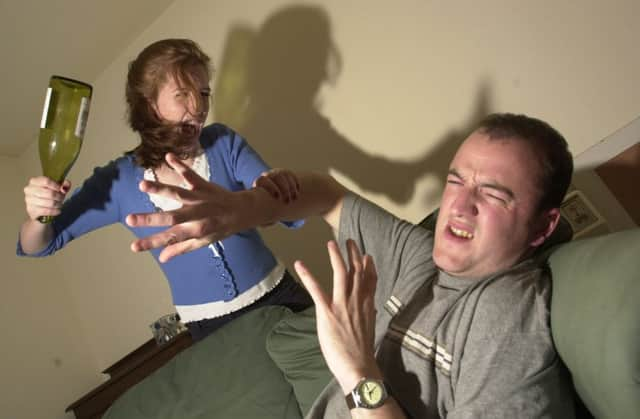Hugh Reilly: Let’s talk about husband beaters too


THE perennial overcrowding problem at Dumfries Prison will be eased this week, albeit marginally, when former SNP MSP Bill Walker exits its less-than-foreboding gates after serving time for assaulting women. Last year, Walker was convicted of physically abusing all three of his ex-wives and a teenage step-daughter. On being found guilty, he received the maximum custodial sentence available to the judge – 12 months.
Walker spent six months of his one-year sentence behind bars, his incarceration reduced as a consequence of him meeting the criteria laid down for automatic early release. Although treated no differently than any other ex-con, his liberation has created something of a political stir.
Advertisement
Hide AdAdvertisement
Hide AdGraeme Pearson, a former senior police officer and now Scottish Labour’s justice spokesman, said: “This is likely to focus people’s minds that the sentence people get in court is not the time they serve in practice.” If Pearson had bothered to read the words of the last Labour justice minister, Cathy Jamieson, he might not have been so perturbed at Walker’s premature discharge. In 2006, announcing her plans for early prisoner release, she said: “Anyone sentenced to more than 14 days will be given a minimum period in custody of 50 per cent of their total sentence.”
Let me be crystal clear: I deplore the violent acts Walker was convicted of, and applaud both the court’s decision and subsequent sentence. However, I can’t help but feel that Walker’s case has become something of a political and social football. Critics complain that he hasn’t shown remorse. Admittedly, I’m running the risk of being labelled a barrack-room lawyer but I’d hazard a guess that any public display of regret would somewhat prejudice his upcoming appeal against the summary court’s verdict.
Quite rightly, the issue of domestic violence is taken seriously these days. Back in the 1970s, when I was briefly Police Constable D379, I attended the aftermath of familial scraps on several occasions. I saw a woman with appalling bruises to her head fight with my colleagues in an effort to free the husband who had knocked her senseless. I still recall the sight of a battered mother comforting her crying kids as we huckled dad in the direction of the police jeep.
However, when I was the temporary bar officer at Blackhill police station, I also remember a drunken young man stumbling in to report he’d been stabbed several times by his girlfriend. Blood seeped from his abdomen and right arm. I immediately phoned for an ambulance and then began taking details of the assault. Just then, the intoxicated perpetrator wandered in, hugged her victim and begged for forgiveness. And they both lived happily ever after.
I highlight this story because, in my view, an act of domestic violence committed by a female against a male is the crime that dare not speak its name. Despite overwhelming objective evidence to the contrary, the orthodox image of women being passive, submissive creatures seems to persist. Tracie Andrews knifed her fiancé 42 times and was released into the community after completing the minimum recommended jail term. Scotland’s roughest prison isn’t Barlinnie or Saughton – it’s Cornton Vale. Stirling’s naughty-step for female offenders recorded more assaults than the Bar-L, even though The Big Hoose has over four times the number of inmates.
That women are predominantly the victims of domestic violence is beyond question (around 92 per cent, according to police figures). I find it disturbing, however, that male casualties continue to be ignored. Part of the problem is the macho-man culture that precludes men from coming forward. Despite males being well-nigh 8 per cent of recorded victims of domestic violence, I’ve never met a man who’s admitted to being slapped about by his lover.
The only high-profile man I can think of who has revealed that he suffered physical abuse in his relationships is Sir Roger Moore. In an interview, the former James Bond stated that his first wife punched, scratched and scarred him. On mentioning she’d thrown a pot of hot tea at him, scalding his side, the audience laughed uproariously. Wife No. 2 whacked him over the head with a guitar – cue for more spectator glee. Chillingly, using words much associated with female victims, Sir Roger said “he deserved it”. Clearly, the experiences left him shaken, not stirred into using the law to protect himself from his attackers.
Even though successive Scottish governments have been aware of significant female-initiated violence in the home, every campaign doggedly portrays men to be the pugilists and women the punchbags. In the iconic awareness-raising ad, “Domestic abuse: There’s No Excuse”, the sufferer is naturally female. Couldn’t we have at least one, just one, government broadcast to alert the population to the disregarded plight of male victims?
Advertisement
Hide AdAdvertisement
Hide AdSchools don’t help the situation by bringing in guest speakers from a smorgasbord of groups who discount the notion that men can be victims too. This approach to domestic disharmony does a great disservice to children who regularly witness their father curled up in the hedgehog position. While the term “wife-beater” has become common parlance, I’ve yet to hear of a vicious female being described as a “husband-beater”.
When it comes to holding brutal women to account, the authorities appear to adopt a more relaxed approach. According to Scottish Government statistics, female perpetrators of violence against their menfolk are less likely to be prosecuted than their male equivalents (66.8 per cent versus 74.2 per cent), and aggressive women are almost twice as likely to get off with a police caution (10.7 per cent to 5.9 per cent).
By continuing to demonise men while beatifying women, we ensure that any discussion of female violence remains taboo a subject. In my opinion, all domestic violence is wrong, no matter the gender of its source.